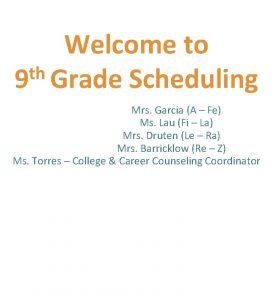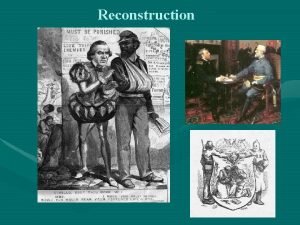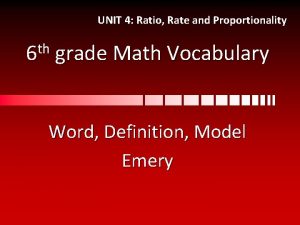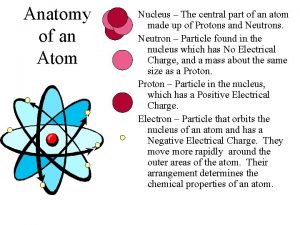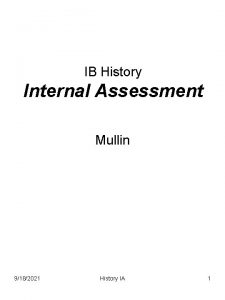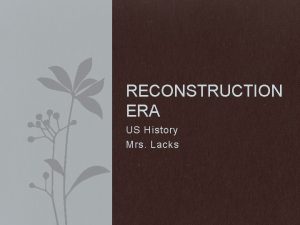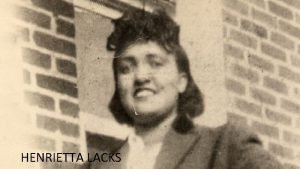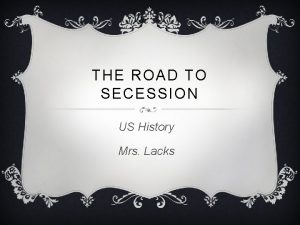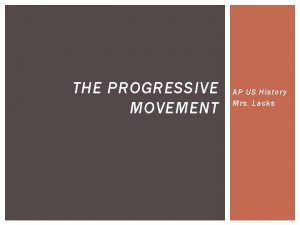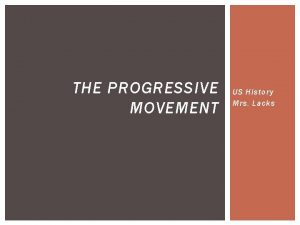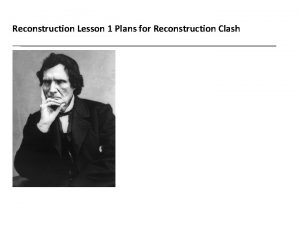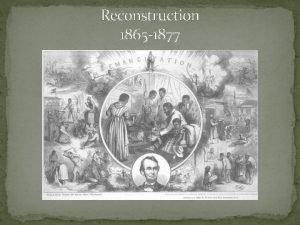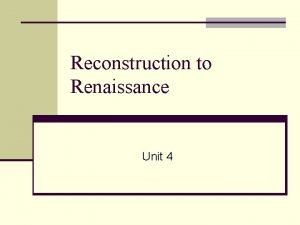RECONSTRUCTION Part II US History Mrs Lacks Whats


























- Slides: 26

RECONSTRUCTION Part II US History Mrs. Lacks

What’s happening in 1868? • Reconstruction Acts are in place • South is still occupied by northern military • All former Confederate states have rejoined the Union except Virginia, Mississippi, and Texas • President Johnson has been impeached, but finished his term • Post War South: Physical & Economic Conditions • physical devastation of land • decreased property values • serious drop in wealth/capita • over 1/5 of adult white men in confederacy were killed • others were maimed for life • 1000 s of blacks also died • women and kids suffer from malnutrition and illness

How did freedmen adjust to society?

Sharecropping & Tenant Farming

Southern Politics • Republicans made of 3 groups • 1. Scalawags - white southerner who joined Republican party • some wanted south to industrialize • majority are small farmers wanting to improve economic position and didn’t want former wealthy farmers to regain power

2. Carpetbaggers northerners who moved to the south after war various motives for moving Southerners considered them ready to loot and plunder the defeated South

Southern Politics - Republicans • 3. African Americans - largest group of southern republicans • 90% of qualified voters actually voted • lack of unity between groups due to different goals

Former Slaves Improve their Lives • education • 1870 - over 90% of freed slaves over 20 were illiterate • during reconstruction people of all ages sought an education • organized their own schools, colleges, universities • Hampton Institute (Hampton University) • black teachers will gradually take over teaching in black schools

Historically Black Colleges

Former Slaves Improve their Lives • churches and volunteer groups • Founded own churches - usually Baptist or Methodist • ministers emerge as influential community leaders • establish their own fire companies, debating clubs, political organizations, etc. • fostered black independence • provide financial and emotional support • provide opportunities to develop leadership skills

Black & White Political Participation

Blacks in Southern Politics • Core voters were black veterans. • Blacks were politically unprepared.

Hiram Rhodes Revels • Born in NC a freeman to a mixed father and white mother • Barber, then preacher • Elected to the Miss State Senate • 1 st African American in the Senate (Republican) • Served from 1870 – 71 (short term because he finished Jefferson Davis’ term) • First of five African Americans to serve in the Senate

Blanche Kelso Bruce • • First African American to serve a full term in Senate (1885 – 1881) Republican Born in VA as a house slave Was legally freed and was arranged to become an apprentice to a printer Moved to Mississippi and became a wealthy landowner Elected to US Senate Only former slave to serve in the Senate First African American to receive any votes at a major party’s nominating convention (1880 Republican National Convention in Chicago)

Failure of Reconstruction • Enforcement Acts 1870 -1871 • federal supervision of elections in the south • gave president power to use federal troops in areas of Klan activity • Amnesty Act - 1872 • returned the right to vote and hold federal or state office to about 160, 000 former confederates (left out high-ranking officials) • weakened power of republicans in the south

Northern Support for Republican Party Wanes • “Grantism” & corruption. • Panic of 1873 [6 -year depression]. • Concern over westward expansion and Indian wars. • All affect Election of 1876 • Republican: Rutherford B. Hayes • Democrat: Samuel J. Tilden


No One Wins Enough Electoral Votes!

Political Crisis of 1877 Corrupt Bargain Part II? North gets Republican President South gets end of Reconstruction

Hayes Wins

Alas, the woes of childhood… Sammy Tilden, “Boo hoo! Ruthy Hayes got my presidency, and he won’t give it to me!”

End of Reconstruction • Home Rule: Southern Democrats regain control • Restricted the rights of freed slaves • Wiped out social programs • Dismantled the public school system

Successes & Failures of Reconstruction Successes Failures - Blacks played a role in politics through Reconstruction’s end. - Race relations didn’t improve. (increased) black/white tensions. - Public schools opened by the Freedmen’s Bureau = open to all. - Ku Klux Klan grew. - Thousands of free blacks learned to read & write. - Race riots occured in the South. - Gov’t corruption increased. - “Redeemers” (Ex-Confederate Democrats) regained control)

Beginnings of “Jim Crow” - 1877: Conservative-Democrat’s control of the South. - Disfranchised (took away) the black vote. - Eight Box Law (1881): had to put your vote in the right ballot box. - Poll Taxes: pay a tax to vote. - Literacy Tests: read part of the Constitution & answer questions. . Poll Tax Receipt

Jim Crow cont… Tactics designed to stop poor & illiterate blacks & whites from voting. 1876 = ex: 90, 000 people in SC voted Republican. 1888 = less than 14, 000 voted Republican. - - Had to own land in some states in order to vote.

Jim Crow cont… - Grandfather Clause: If grandfather voted before the Civil War, then you could. - Plessy vs. Ferguson (1896): Supreme Court; established principle of “separate but equal” facilities for blacks & whites (rarely equal). - Led to de jure segregation.
 The immortal life of henrietta lacks table of contents
The immortal life of henrietta lacks table of contents Needs analysis necessities lacks wants
Needs analysis necessities lacks wants Howard w jones
Howard w jones Brack plaques radium
Brack plaques radium What is propaganda movement?
What is propaganda movement? The immortal life of henrietta lacks discussion questions
The immortal life of henrietta lacks discussion questions Mr. knight learned the art of watchmaking
Mr. knight learned the art of watchmaking Work on the production line is monotonous and lacks
Work on the production line is monotonous and lacks Organism whose cells contain a nucleus
Organism whose cells contain a nucleus They are mrs garcia and mrs castro
They are mrs garcia and mrs castro They are mrs garcia and mrs castro
They are mrs garcia and mrs castro Mrs. darling was ___________ of mrs. s.
Mrs. darling was ___________ of mrs. s. In american history the term reconstruction refers to
In american history the term reconstruction refers to Bought a beautiful dress at the mall
Bought a beautiful dress at the mall Ms turnbull history
Ms turnbull history Addition symbol
Addition symbol Part to part ratio definition
Part to part ratio definition Brainpop ratios
Brainpop ratios What is a technical description?
What is a technical description? The front bar
The front bar The phase of the moon you see depends on ______.
The phase of the moon you see depends on ______. Two way anova minitab 17
Two way anova minitab 17 Whats the central part of an atom
Whats the central part of an atom Whats hot whats not
Whats hot whats not Art of emerging europe ppt
Art of emerging europe ppt History ia format
History ia format Examples of salvation history in the bible
Examples of salvation history in the bible










